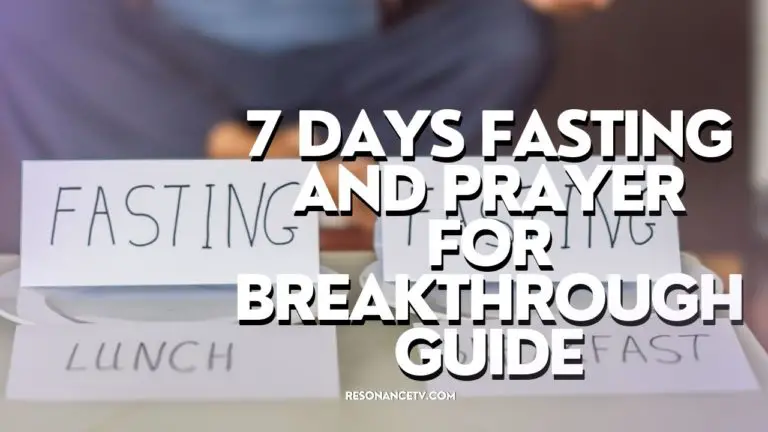One of the questions in the minds of a lot of people is how to fast and pray for a breakthrough in their lives. There is no one-size-fits-all pattern for praying for a breakthrough, but I will encourage you to make up your mind for a change, cry out to God, and He’ll take care of the rest.
In this article, I will answer a lot of questions and show you how you can pray for a breakthrough.
Before we begin,
If you want your fasting and prayer to not be in vain, ensure your motive is good.
God may not answer your prayers if you pray for a breakthrough because you want to prove a point or impress someone. James 4:3 points out wrong motives as one of the reasons why people’s prayers aren’t answered.
Table of Contents
Here’s The 7 Days Fasting And Prayer For Breakthrough Guide
Whether you’re preparing for a 3, 5, or 7-day fast, you can follow some of the steps I’ve outlined below to help you. You must fast and pray properly and not just go on hunger strike for a period. Learn More.
So let’s proceed.
1. Determine how long your fast will be.
The first step is to decide how long you want to fast. As I mentioned, you can fast for three days, five days, seven days, 14 days, 21 days, 40 days, etc.
Once you’ve decided on the length of your fast, make sure you commit to it and don’t back out. Set a start date and end date for your fast and determine the time frame for your fast.
Lean on the leading of God through the Holy Spirit when choosing a fasting time.
2. Make time for prayer every day during your fast.
It’s important that you set out enough time to pray and seek God’s face during your fast. If you are working during your fasting days, I suggest you wake up earlier than usual to pray and use your break periods or any other free periods you have to pray.
3. Worship God during your fast.
Make sure you take some time each day to worship God. This can be done through singing, playing an instrument, listening to worship music, or reading the Bible.
Whatever you do, make sure you spend some time each day lifting your heart and hands in soul-lifting worship to God with a lot of thanks to him for his graciousness.
4. Make A List of Bible Verses suited for the motive of your fasting
Make a list of the bible verses that keep you encouraged and focused during your fast. Read them out loud whenever you feel like you’re losing focus or getting weak.
And pick out prayer points from them where necessary. A typical example is 1 Chronicle 4:10, where Jabez cried out for help. His prayer points for a breakthrough are mentioned in those verses.

5. Keep a journal during your fast.
Write down everything you’re feeling, thinking, and experiencing during your fast. This will help you document your journey and keep track of how God is moving in your life during the fast.
Also, document any answered prayers and miracles you experienced during the fast.
6. End your fast with thanksgiving and celebration.
Make sure you break your fast with a prayer of thanksgiving to God. And also celebrate what he has done in your life during the fast.
Personally, the last two days of my fast are dedicated to thanking God.
I don’t say many prayers on those days but instead praise, dance, and rejoice for what God has done, is doing, and will do. Hallelujah.
What does it mean to fast and pray?
Fasting is going without food or something for a specific period, usually for religious reasons. You focus more on God when you fast because you’re not preoccupied with those items you’re fasting from.
Prayer, on the other hand, is communication with God. It’s a two-way conversation in which you talk to God, and he talks to you through leadings in your heart, visions, and dreams.
The Bible has a lot to say about fasting and prayer.
In the Old Testament, we see examples of people fasting while they were waiting on God for guidance (Judges 20:26), protection from their enemies, or during a time of mourning. We mentioned lots of bible verses in the bible verses section below.
In the New Testament, Jesus fasted for 40 days before he started his ministry (Matthew 4:2), and we see the early church taking part in prayer and fasting when making important decisions (Acts 13:3).
This is fasting and prayer to cry out to God to change a sorry situation into a better situation. A typical example of fasting and prayer for a breakthrough in the bible is in the case of Esther in the book of Esther 4.
Before Esther went to the king to plead for her people, she and her maids and the Jews fasted and prayed for three days (Esther 4:16). God heard their prayers and answered, and the king had a change of heart and saved the Jews.
What You Need to Know
Now that you’ve decided to fast, there are a few things I’d like to point out. You may already know some of them, especially number one.
So, let’s begin.
1. You Can Fast from Things Besides Food

The first thing you need to know is that you can fast from things other than food. You can fast from TV, social media, your phone, or anything else that takes up your time. Some people also choose indoor fasting, a form of fasting where they stay indoors and pray while minimizing contact with people outside.
Also, you can fast from specific types of foods. For instance, instead of eating solid foods, you eat mostly fruit salads for the duration of your fast.
2. You Can Fast for Different Lengths of Time
The second thing you need to know is that you can fast for different lengths of time. You can fast for one meal, one day, three days, a week, or more. It all depends on how much time you have and how committed you are.
3. Jesus Noted That His Followers Would Fast
The third thing you need to know is that Jesus noted that his followers would fast. In Matthew 9:14-15, we see that the disciples of John the Baptist and the Pharisees were fasting, but when Jesus’ disciples didn’t fast, people criticized them.
Jesus’ response was that they would eventually fast but not at that particular time because he was with them.
So if you’re a Christian and you don’t fast, wahala dey o
4. Fasting is a Form of Worship
Another thing you need to know is that fasting is a form of worship. When you fast, you’re essentially saying to God that he is more important to you than the things you’re giving up.
5. Fasting is Powerful
Lastly, you need to know that prayer should accompany your fast. Fasting without prayer is just abstinence from food or something else. But when you add prayer to your fast, you’re entering into a time of intense communion with God.
So make sure you set aside enough time to pray while fasting. And if you can’t fast for an extended period, try fasting for one meal or even one day. Make sure you pray fervently and believe God will answer your prayers.
What are the different types of Biblical fasting?
Here are some types of fasting.
- A Complete/Total Fast: This is when a person abstains from food and water for a specific period.
- A Partial/Selective Fast: This is when a person abstains from certain foods while consuming others. For instance, you may choose to only eat vegetables and fruit while avoiding meat and dairy.
- A Non-Food Fast: As I mentioned, you can also do a complete social media or phone fast for a specific period. This is a non-food fast and can help you get yourself together if you’re struggling with anything.
- Group Fasting: Group fasting is when a group of people come together and fast for a specific purpose.
- Isolation Fast: An isolation fast is when you go off by yourself to fast and pray. This is usually done for a more extended period, such as a week or more.

What is the importance?
Some of the benefits of fasting include:
- Improved mental clarity
- More focus
- Greater self-control
- More discipline
- A deeper relationship with God
- Greater physical health
How long and often should you fast?
There’s no one-size-fits-all answer to this question. It all depends on your situation and what you’re seeking God for. However, I recommend fasting and praying for at least three days or more if you seek a breakthrough in your life.
This is completely up to you and should be based on the leading of the Holy Spirit. Some people fast once a month; some fast once a week, and others even fast every day. It all depends on how much time you need to spend with God and how often you feel the need to fast.
There’s no wrong or right answer here. Just follow the leading of the Holy Spirit in your life.
What are some prayers should you say?
- Thank you, God, for always being there for me. I come to you today seeking your help and guidance in my life. God, I know you are a loving Father who wants the best for me. I thank you for always taking care of me and for never abandoning me.
- I declare that I am open to your will and will follow your direction no matter what.
- Lord, I need your breakthrough in my life! Please hear my prayers and grant me the desires of my heart according to your will.
- Father God, I ask that you would reveal yourself to me during this time of fasting and prayer. Show me your plan for my life and guide me on the path you want me to take.
- In Jesus’ name, I break every chain holding me back from progressing in life.
- All limitations around me will not hold me.
- I receive divine speed to excel in my endeavors.
- Every door shut against me, be broken by fire.
What scripture talks about fasting and prayer?
What does the bible say about fasting and prayer? In Matt. 17:21-23, Jesus highlighted the importance of fasting and prayer for anyone that wants to take charge of situations around their life. Here are other bible verses about fasting and praying.
- Isaiah 58:6
- Joel 2:12
- Acts 13:2
- Daniel 9:3
- Ezra 8:23
- Matthew 6:16-18
- Luke 2:37
- 2 Chronicles 20:3
- 2 Samuel 12:16
- Nehemiah 1:4
- Esther 4:16
Have you ever tried fasting and praying for a breakthrough in your life? If not, now might be the time to give it a go. The results can be amazing! We’d love to hear about your experience – share with us in the comments below.







